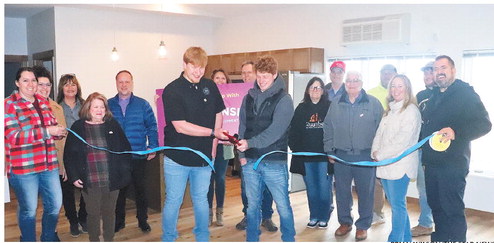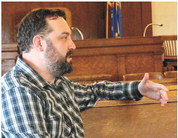Victim’s unwillingness to testify leads to plea deal
A Medford woman who was facing criminal charges for having sexual contact with a then-17-year-old who was enrolled in the Medford Area Public School District’s Alternative High School program was in Taylor County circuit court on Monday for a sentencing hearing.
Pamela J. Schield, 62, of Medford, was originally scheduled to begin a five-day jury trial on the case that originates from contact that is alleged to have occurred in April and May 2017. However, her attorney, Wright Laufenberg of Merrill, and Taylor County District Attorney Kristi Tlusty were able to reach a plea agreement.
Under terms of the agreement, Schield agreed to plead no contest to a charge of exposing a child to harmful material — a Class I felony. She was ordered to pay a $1,000 fine plus court costs and submit a DNA sample. Judge Knox-Bauer further agreed to defer entry of judgment for a period of two years with standard conditions and with the stipulation that the defendant will not seek license with the Department of Public Instruction and sign an agreement prepared by the DPI to ensure compliance with that provision. In addition, she will not be employed or volunteer in a capacity that allowed her to work with students or individuals under the age of 18. Further conditions include submitting a letter of apology to the victim and his family and counseling. Upon successful completion of the agreement, the state agreed to dismiss count one.
In addition, Schield agreed to plead no contest and was found guilty of an amended charge of unauthorized use of a computerized system, a class B misdemeanor.
Under terms of the plea agreement, charges of child enticement, a Class D felony carrying a penalty of up to 25 years in prison, and sexual assault of a child by a person who works or volunteers with children — a Class H felony carrying a penalty of up to six years in prison, were dismissed but read in for sentencing purposes.
According to the criminal complaint, Schield and the victim allegedly had been in a relationship and that she had sent inappropriate pictures of herself to him via a social media platform as well as having sexual contact in late spring 2017. At the time, Schield of Medford, was coordinator of the Taylor County Literacy Council and had up until December 2016 been a substitute teacher with the Alternative High School program. The two programs utilize adjoining spaces in the Taylor County Education Center. In her position as coordinator, Schield wrote numerous grants for the organization and assisted with adult mentoring and training other adult mentors.
Much of the time at court on Monday was spent with district attorney Tlusty and defense attorney Laufenberg explaining the reasoning for the agreement as well as the judge noting the extensive rights given to victims under a recent amendment to Wisconsin’s constitution.
According to Tlusty, the agreement balanced the need for justice for violating the law with the wishes of the victim to not have to testify at trial. She noted it was a joint recommendation from both her and the defense attorney.
She said of the charges, the class I felony count, the lowest level of felony in the state, was the one with the strongest amount of evidence to bring to trial. Tlusty also noted that this was also the only charge that had some admission from the defendant.
She noted that of social media platforms, Snapchat is not reliable with providing files even under a subpoena while other platforms such as Facebook readily comply. She said that while the state had a copy of a screenshot, it does not indicate a date that it was taken. “We didn’t receive the smoking gun in the Snapchat records,” Tlusty said.
By the time information was brought to law enforcement, the victim was well past age 18 and Tlusty said they had no way of telling if the picture had been received after he had turned 18.
Tlusty went on to note that the victim’s credibility could have been attacked if the state had pressed to go to trial and noted jury instructions are to take into account the credibility of witnesses. She went on to note that it was not the victim himself, but his then girlfriend who brought it to law enforcement in 2018 and at that time the victim’s recollection of events was labored.
Tlusty noted that even when the state has a strong, cooperative victim who is willing to testify, a sexual assault case can end with a not guilty verdict. In this case, a trial would have been forcing the victim to testify against his wishes.
Tlusty noted that the entire case would have hinged on that testimony and that rumors are not admissible at trial. Tlusty said that she feels the agreement meets the goal of protecting the public by ensuring that the defendant will not be able to be in a position of teaching minors and holds the felony penalties over her head if she does not follow through with the conditions laid out in the agreement.
“This was not reached because she was a female or because of her last name,” Tlusty said, but rather is to respect the victim’s wishes and privacy.
In his statement in support of the agreement, attorney Laufenberg, said there was a 90% chance that his client would have been acquitted on all charges. He raised doubts about the credibility of the witness and that the defense had ample evidence to prove that contact could not have occurred on the day the criminal complaint states it occurred.
Laufenberg said law enforcement tried to backdate it to before the alleged victim turned 18 despite him saying it happened in the summertime. “The state literally had no ability to prove counts two and three,” Laufenberg said.
As far as the social media records, Laufenberg stated there were detailed Snapchat records with a different adult female who was not his client.
Laufenberg said his client made an extremely poor choice and has suffered for it with the loss of her career that she earned a doctorate for and the loss of her reputation.
“A lot of people make poor romantic choices, they usually don’t have this level of severe consequences,” he said. He noted that the agreement places a very large hammer over his client’s head and that the compromise reached in the agreement was a fair one to avoid a lengthy trial.
Schield also spoke at the hearing stating she made a poor choice. “I take full responsibility for the many people that have been impacted by the poor choices I made,” she said.
“I can’t reverse my choices, I can strive with God’s help to prove to all parties that I have learned from my poor choices and that I can be an asset to my community.”
Judge Ann Knox-Bauer praised the agreement and the process that lead to it.
“The job of a prosecutor is to do justice,” Knox-Bauer said, noting that is not always a conviction or sending people to jail or prison.
She noted the prosecutorial discretion that leads to charges being filed and what those charges may be. She also brought in the Marsey’s law amendment to the state constitution which gives significant rights to victims to be heard and have input on how cases are prosecuted. “They get to express what they think should happen with the case,” she said, noting that in this case the victim was reticent and not wanting to cooperate.
Knox-Bauer noted that faced with the only evidence being the victim’s unwilling testimony, it is up to the prosecutor to find a way for there to be some kind of consequences. Something she said the agreement that was reached does, especially in regard to the prohibition on being able to get licensure through the DPI in the future.




